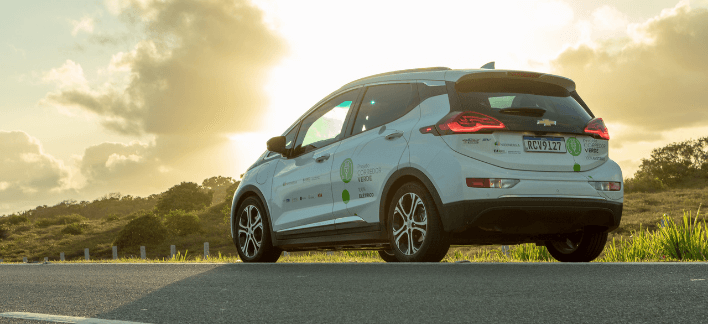
Neoenergia inaugurates the larger electric road in Brazil with charging stations for fast loads
The first electric mobility corridor in Northeast region is being developed by Neoenergia and, once completed, by the end of the first half of 2021, it will be the largest in Brazil, It will connect the capitals Salvador (BA) and Natal (RN), crossing Aracaju (SE), Maceió (AL), Recife (PE) and João Pessoa (PB). The Green Corridor is a result of a Research and Development (R&D) project, regulated by National Electric Energy Agency (Aneel), and is part of Neoenergia's Electric Mobility Program, which integrates the company's plans to invest in stimulating the use of electric vehicles and in the process of economy decarbonization. The project will be 1,100 km long, and will have a structure comprising 18 charging stations over the roads connecting the states and in urban areas.
The first phase was started this month in Salvador and comprises the performance assessment for electric cars in urban routes with proposals of opening charging stations to the public. On an experimental basis, six electric and hybrid vehicles are traveling through various stretches in Salvador. This initial period is essential to evaluate the autonomy of the cars, performance in daily situations and defining adjustments and improvements. Further charging stations will be gradually delivered up to the end of the first half in 2021. Once completed, The Green Corridor should cover six of the nine Northeastern states, passing through 70 municipalities and contributing so that thousands of people can join electric mobility in a more sustainable way.
In total, the Green Corridor will have 18 charging stations. From these, 12 will be placed along the routes connecting the six capitals in SuperChargers format, which allows a fast charge - about 30 minutes - and two vehicles being charged at the same time. The other charging stations will be of Wallbox type, which have medium load and will be installed in urban areas and shopping malls, with capacity for one vehicle at a time.
“This is an important challenge for Neoenergia, as we will prepare a business model to allows feasibility and functionality of the Green Corridor. We recognize the importance of ensuring sustainable development through actions aimed at combating climate change and the investment in electric mobility is a part of this commitment. After all, the use of electric cars reduces the emission of greenhouse gases, contributing to the planet decarbonization. We are also studying the combination of charging stations with solar energy, which is an important renewable, non-pollutant source", says José Brito, Neoenergia's Research & Development corporate manager.
In addition to the environmental benefit, electric cars feature additional advantages, such as efficiency. The electric vehicle runs 100 kilometers for a lower amount when compared to other fuels. It avoids noise pollution because it does not produce sounds, and can be more practical, since the electric motor has fewer parts and takes up a smaller space in the car. All these factors combined contribute to stimulating ecological awareness and investment in 'green' initiatives.
INNOVATION ONGOING
The R&D project also comprises the creation of software that will contribute to Green Corridor management and use. Drivers will be able to access an app which will displays information on the booking of vehicles, charging stations location and payment. The system for managing charging stations will include data from recharging stations and dynamic tariff setting.
In addition, the company is developing an experimentation laboratory created to analyze scenarios of possible tariffs that may be charged to vehicle users in a possible opening of the charging stations to the general public. “Our goal is to make the Green Corridor commercially feasible, this, our project encompasses business models that contemplate this while promoting sustainable initiatives for all", says Brito.
ELECTRIC MOBILITY
Since March, Neoenergia has started to have its own electric vehicle fleet for use in administrative activities. Thus, it started to provide electric chargers in all company's regional and administrative bases, distributed in the states of São Paulo, Rio de Janeiro, Bahia, Pernambuco and Rio Grande do Norte.
The electric mobility projects developed by the company also include investment in a fully electric truck for use in distribution network maintenance services, in addition to the expansion of the existing charging station system in Fernando de Noronha, supplied with solar source, as a way of ensuring a renewable energy source for charging cars, and the training of the local workforce for electric car maintenance.
Neoenergia actions are in line with Sustainable Development Goals (SDG) proposed by the United Nations. Accordingly, the company seeks to develop projects and actions for contributing to the quality of life in the planet. Among SGDs, the company is particularly focused on SDG 7, which aims to provide affordable and clean energy for all and SDG 13, aimed to adopt urgent measures to combat climate changes and its impacts.
ShP - Certificado Verde
News
2025-12-12
Prêmio Brasil Olímpico 2025: Neoenergia reforça compromisso com esporte feminino no país
2025-12-09
Prêmio Aberje 2025: Neoenergia é campeã nacional com campanha sobre segurança na rede elétrica com Carlinhos Brown
2025-12-01
Exclusivo a mulheres negras, Prêmio Inspirar 2025, do Instituto Neoenergia, anuncia vencedoras em quatro estados e no DF
2025-11-27
Neoenergia e Honda se unem para acelerar uso do hidrogênio verde na mobilidade brasileira
2025-11-25
